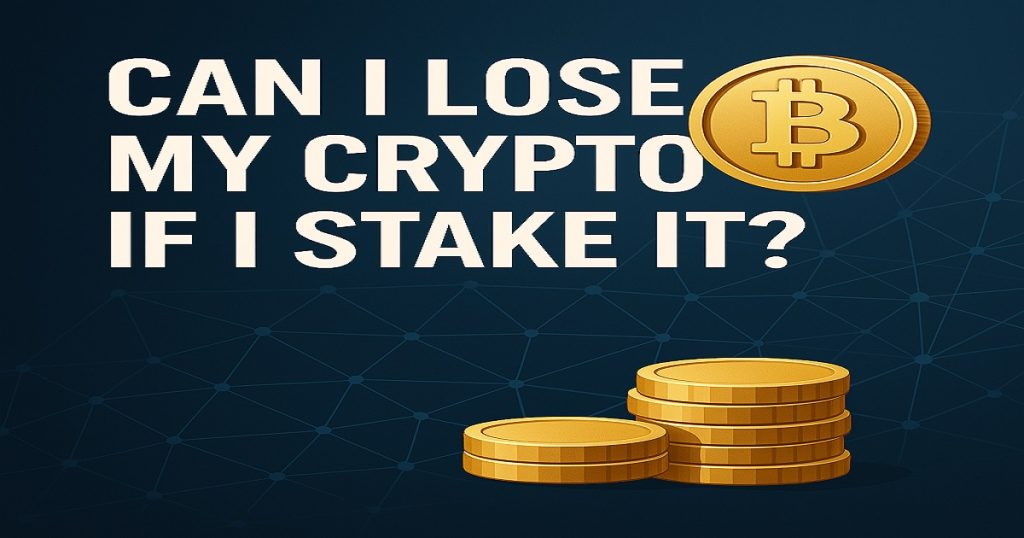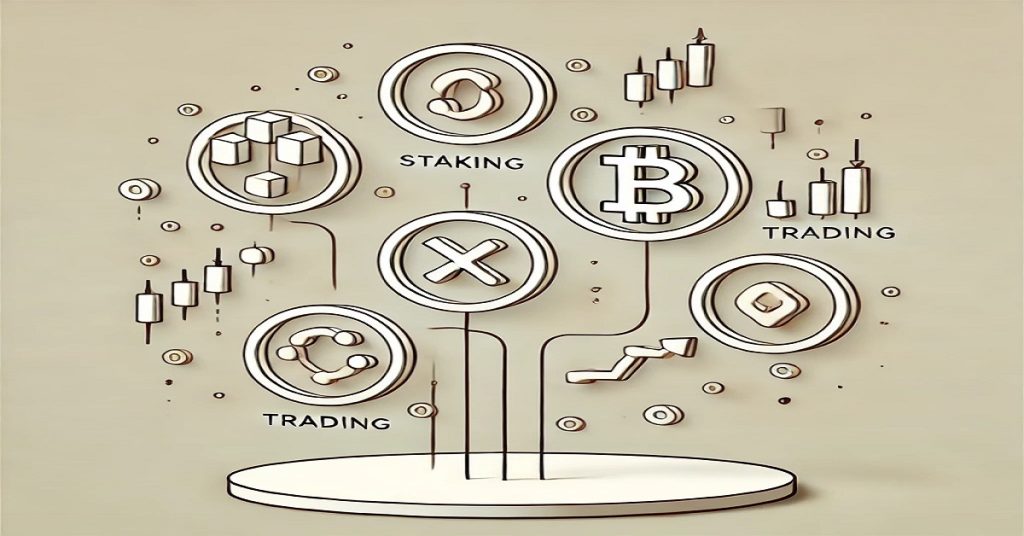Staking has become a popular way to earn passive income in the crypto world, but one common concern remains: Can I lose my crypto if I stake it? The short answer is yes, there are risks involved—but they vary depending on the platform, the token, and how you stake. In this article, we’ll break down the potential risks, how to protect your investment, and what beginners should keep in mind.

What Is Crypto Staking?
Before we tackle the big question—can I lose my crypto if I stake it?—let’s first understand staking. Staking involves locking your crypto assets in a blockchain network to help validate transactions. In return, you earn rewards, usually in the same token. It’s similar to earning interest in a savings account, but with higher returns—and higher risks.
If you’re just getting started, our beginner-friendly guide How Do Beginners Buy Cryptocurrency? will help you understand the basics before you dive into staking.
Understanding Lock-Up Periods and Liquidity.
Many staking programs require you to lock your funds for a set period—this is known as the lock-up or bonding period. During this time, you can’t withdraw or sell your tokens. This reduces your liquidity and exposes you to price fluctuations. If the market drops while your crypto is locked, you may suffer losses without being able to react.
Can I Lose My Crypto If I Stake It?
Now, let’s answer the key question: Can I lose my crypto if I stake it? Yes, here’s how it can happen:
- Validator Misbehavior: If you stake via a validator who behaves dishonestly or goes offline frequently, you may face “slashing”—a penalty where a portion of your stake is lost.
- Platform Risks: If you stake through an exchange or DeFi platform that gets hacked or goes bankrupt, your funds may be unrecoverable.
- Smart Contract Bugs: Staking often involves smart contracts. Bugs or exploits in the code can lead to the loss of funds.
- Price Volatility: Even if you earn staking rewards, the token’s price might crash, reducing your overall value.
So, can I lose my crypto if I stake it? Yes, especially if you don’t do proper research or blindly trust a third-party service.
Types of Staking: Centralized vs. Decentralized Platforms
When deciding where to stake, you’ll likely come across two options:
- Centralized platforms (e.g., exchanges): These are convenient but risky. Your keys are held by the platform, which means if the exchange is hacked or shuts down, your assets may be lost.
- Decentralized staking (DeFi protocols): You retain control of your private keys, which can be safer—if you understand how to use non-custodial wallets and secure your seed phrase.
Each has pros and cons, but both involve risk. Can I lose my crypto if I stake it? Yes—even if you use a big name exchange. Self-custody is often the safer path for advanced users.
How to Minimize the Risks
To reduce the risk of loss:
- Use reputable platforms with strong security.
- Choose reliable validators.
- Diversify your crypto holdings.
- Don’t stake everything—keep some liquidity.
- Consider staking native coins (like ETH or FTS) rather than high-risk tokens.
Learn more about staking strategies and long-term benefits in Is Staking Crypto Worth It?
Common Mistakes New Stakers Make
Many beginners lose crypto by making avoidable errors, such as:
- Staking fake tokens or falling for scams
- Sending tokens to the wrong address
- Not understanding the lock-up terms
- Trusting unverified validators or DeFi apps
If you’re new to crypto, it’s critical to learn the basics before jumping into staking. Start with How Do Beginners Buy Cryptocurrency? to build a strong foundation.
Is Staking Right for You?
If you’re new to crypto, you might want to start with beginner-friendly coins. Check out our article on The Best Crypto for Beginners in 2025 for easy-to-stake, stable coins.
Wondering whether staking can lead to real income? You’re not alone. Many investors ask, Can You Make $1,000 a Month With Crypto?. The answer depends on how much you stake, your chosen token, and market conditions.
Staking vs. Trading: Which is Safer?
While both staking and trading have risks, they cater to different strategies. Staking is more passive and can provide steady income if you choose well. Trading is active and often high-risk, high-reward.
If you’re wondering can I lose my crypto if I stake it, the short answer is yes—but it’s often less risky than day trading or margin trading.
Curious if staking can replace income? Check out Can You Make $1,000 a Month With Crypto?
Regulatory and Tax Considerations
Another hidden risk involves taxation. In many countries, staking rewards are considered taxable income. For accurate info, visit this U.S. government IRS page on virtual currencies to see how staking may impact your taxes.
Staking Outlook for 2025: Growth and Challenges.
Staking is evolving rapidly, with Ethereum 2.0 and other Proof-of-Stake networks leading the way. But 2025 may bring new challenges—like increased government oversight, tax enforcement, and stricter rules on platforms.
Despite this, staking remains a powerful tool. The big question—can I lose my crypto if I stake it?—will depend more than ever on staying informed, choosing the right projects, and understanding the legal environment.
Want to know which tokens are staking-friendly and growing fast? Visit The Best Crypto to Invest In: A Guide for 2025
Staking Fortis Token – A Safer Alternative?

If you’re exploring options beyond the popular tokens, consider staking Fortis (FTS)—a project designed with sustainability and investor protection in mind. The Fortis staking system includes smart anti-whale features, low fees, and transparent mechanics, making it a potentially safer choice for long-term holders.
Unlike many anonymous or overly hyped tokens, Fortis provides clarity through its fixed 100M supply and community-focused rewards. If you’re wondering, can I lose my crypto if I stake it?—Fortis offers minimized risk through robust smart contract design and a fixed daily reward model.
Learn more about Fortis Token Staking Cryptocurrency and how it supports passive income while keeping user control a priority.
🛒 How to Buy Fortis – Step-by-Step
Not sure how to get started with Fortis? Buying FTS is simple and beginner-friendly. Whether you’re new to crypto or a seasoned trader looking for a reliable staking token, Fortis can be a strategic addition to your portfolio.
Visit How to Buy Fortis Cryptocurrency for a detailed, step-by-step guide that walks you through exchanges, wallets, and staking options.
Final Thoughts
So, can I lose my crypto if I stake it? Absolutely—but with research, risk management, and using secure platforms, staking can be a profitable long-term strategy. If you’re deciding where to invest next, check out The Best Crypto to Invest In: A Guide for 2025.
Never invest more than you can afford to lose, especially when it comes to staking.
Can I lose my crypto if I stake it? You now know the risks—and how to manage them.
Can I lose my crypto if I stake it on an exchange?
Yes, you can lose your crypto if you stake it on a centralized exchange that gets hacked, freezes withdrawals, or becomes insolvent. Always research the platform’s reputation and consider using non-custodial wallets for added security.
Can I lose my crypto if I stake it through a smart contract?
Smart contracts carry risks too. If the contract has bugs or vulnerabilities, funds can be exploited or lost. Make sure the staking contract is audited and backed by a reputable team.
What’s the safest way to stake crypto without losing it?
The safest way is to use a reputable project with audited contracts, stake only what you can afford to lock, and avoid third-party custodians. Staking Fortis Token, for example, is designed with safety mechanisms. Learn more at Fortis Token Staking Cryptocurrency.
Can I lose my crypto if I stake it and the token price crashes?
Yes, even if you earn staking rewards, a major drop in token value can lead to overall losses. It’s important to consider price volatility when deciding to stake.
Can beginners stake crypto safely without losing money?
Can beginners stake crypto safely without losing money?


